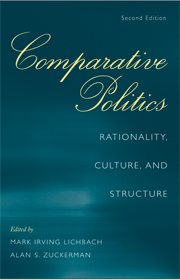Book contents
- Frontmatter
- Contents
- Contributors
- Preface and Acknowledgments
- 1 PARADIGMS AND PRAGMATISM
- 2 THINKING AND WORKING IN THE MIDST OF THINGS
- 3 ADVANCING EXPLANATION IN COMPARATIVE POLITICS
- 4 STRONG THEORY, COMPLEX HISTORY
- 5 RECONSIDERATIONS OF RATIONAL CHOICE IN COMPARATIVE AND HISTORICAL ANALYSIS
- 6 CULTURE IN COMPARATIVE POLITICAL ANALYSIS
- 7 RESEARCHING THE STATE
- 8 AN APPROACH TO COMPARATIVE ANALYSIS OR A SUBFIELD WITHIN A SUBFIELD?
- 9 THE GLOBAL CONTEXT OF COMPARATIVE POLITICS
- 10 COMPARATIVE PERSPECTIVES ON CONTENTIOUS POLITICS
- 11 CITIZENSHIP IN DEMOCRATIC POLITICS
- 12 NESTED CITIZENS
- 13 BACK TO THE FUTURE
- 14 THE COMPARATIVE POLITICAL ECONOMY OF THE WELFARE STATE
- 15 MAKING CAUSAL CLAIMS ABOUT THE EFFECT OF “ETHNICITY”
- References
- Author Index
- Subject Index
- Titles in the series
11 - CITIZENSHIP IN DEMOCRATIC POLITICS
DENSITY DEPENDENCE AND THE MICRO–MACRO DIVIDE
Published online by Cambridge University Press: 05 June 2012
- Frontmatter
- Contents
- Contributors
- Preface and Acknowledgments
- 1 PARADIGMS AND PRAGMATISM
- 2 THINKING AND WORKING IN THE MIDST OF THINGS
- 3 ADVANCING EXPLANATION IN COMPARATIVE POLITICS
- 4 STRONG THEORY, COMPLEX HISTORY
- 5 RECONSIDERATIONS OF RATIONAL CHOICE IN COMPARATIVE AND HISTORICAL ANALYSIS
- 6 CULTURE IN COMPARATIVE POLITICAL ANALYSIS
- 7 RESEARCHING THE STATE
- 8 AN APPROACH TO COMPARATIVE ANALYSIS OR A SUBFIELD WITHIN A SUBFIELD?
- 9 THE GLOBAL CONTEXT OF COMPARATIVE POLITICS
- 10 COMPARATIVE PERSPECTIVES ON CONTENTIOUS POLITICS
- 11 CITIZENSHIP IN DEMOCRATIC POLITICS
- 12 NESTED CITIZENS
- 13 BACK TO THE FUTURE
- 14 THE COMPARATIVE POLITICAL ECONOMY OF THE WELFARE STATE
- 15 MAKING CAUSAL CLAIMS ABOUT THE EFFECT OF “ETHNICITY”
- References
- Author Index
- Subject Index
- Titles in the series
Summary
INTRODUCTION AND OVERVIEW
More than a century of systematic analysis regarding citizens and democratic politics has produced a continuing tension that centers on what has sometimes been called the “micro–macro divide” (Eulau 1963, 1986). Quite simply, should our understanding of electoral politics be focused on aggregates or individuals – on the properties, performance, and behaviors of aggregated electorates or on the choices, capacities, and opinions of individual citizens? While this question is fundamental to theoretical and methodological developments in political analysis, it is particularly compelling with respect to comparative analysis, and this chapter argues that its resolution involves a thoroughly comparative approach to the study of democratic politics.
At the most basic level, this tension involves whether analysts should employ aggregates or individuals as the basic level of analysis. The increased prominence of methodological individualism in all its various forms means that many efforts have rejected the former for the pursuit of the latter, embracing a framework built on some combination of individual preferences, utilities, attitudes, opinions, and resources. At the same time, methodological individualism comes at a price, producing a frequently cumbersome and sometimes irrelevant framework for the analysis of politics writ large. The analytic difficulties posed by methodological individualism have generated a number of theoretical and substantive shortcuts to make analyses tractable. The state as a unitary actor, the weight of public opinion, the public mood, the existence of a political culture, and the imposition of structural constraints are aggregate inventions constructed, at least in part, as explanatory devices to avoid the unwieldy and sometimes inappropriate apparatus imposed by a reliance on citizens as the ultimate component units of democratic politics.
- Type
- Chapter
- Information
- Comparative PoliticsRationality, Culture, and Structure, pp. 291 - 313Publisher: Cambridge University PressPrint publication year: 2009
- 2
- Cited by



